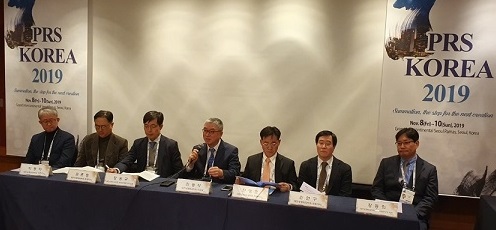Some medical institutions were found to have recommended patients to remove the breast implant amid worries over breast implant-associated anaplastic large cell lymphoma (BIA-ALCL), rare cancer. However, plastic surgeons’ group warned physicians against unnecessary breast implant removal.

Kim Kwang-seog, chairman of the Korean Society of Plastic and Reconstructive Surgeons (KSPRS)’ board of directors, said the society’s guidelines stated that physicians should not remove breast implants if the patient had no symptoms, which was in line with the global standard. The group’s ethics committee would review such an unfair medical practice with keen interest, he added.
His remarks came at a news conference at PRS Korea 2019, an international conference hosted by KSPRS, in southern Seoul, Friday.
According to Kim, some hospitals encouraged breast implant recipients to have surgery to remove the breast implant “to prevent BIA-ALCL” and demanded them to pay for excessive surgical expenses.
“This kind of act is unethical because medical professionals seek profits by creating fears for anxious patients who have no expertise,” Kim said.
Kim emphasized that KSPRS members should not recommend or advertise breast implant removal for patients with no abnormal symptoms, or demand excessive payments for such surgery. He also said that a regional trauma center’s dedicated specialist department or support specialist department should include plastic surgery.
Plastic surgery is divided into the cosmetic surgery and reconstructive surgery, but these two areas are closely connective, he noted. In the history of plastic surgery, efforts to reconstruct damages of trauma patients have been the source of developing cosmetic surgery, according to Kim.
Despite plastic surgery department’s crucial role as a specialist department in trauma treatment, it was out of the list of specialist departments for regional trauma centers, Kim went on to say. Plastic surgery was also excluded from the designation of additional support specialist departments in 2018, which made it difficult to treat trauma patients, he added.
“The government and the public should change their perception of plastic surgery’s role to advance the medical delivery system in emergency trauma patient treatment,” Kim said. “By allowing plastic surgeons to participate in the initial treatment stage for trauma patients, we will be able to provide the optimal medical service for them, minimize disorder, and improve patients’ quality of life, and save medical costs.”
KSPRS voiced considerable concerns about moves by the government and the National Assembly to allow non-medical professionals to provide tattoo services.
“If doctors do not manage these procedures, bleeding after the invasive procedure can increase the prevalence of infectious diseases such as hepatitis B and C, syphilis, and AIDS,” Kim said. “Side effects such as granuloma formation and false lymphoma development may occur at the site of the procedure.”
If non-physicians provide tattoo services, they may not be able to deal with related problems such as foreign body reactions and hypersensitivity reactions, he noted.
“Enacting a separate tattoo law will contradict the uniformity of the medical law system,” Kim added.

